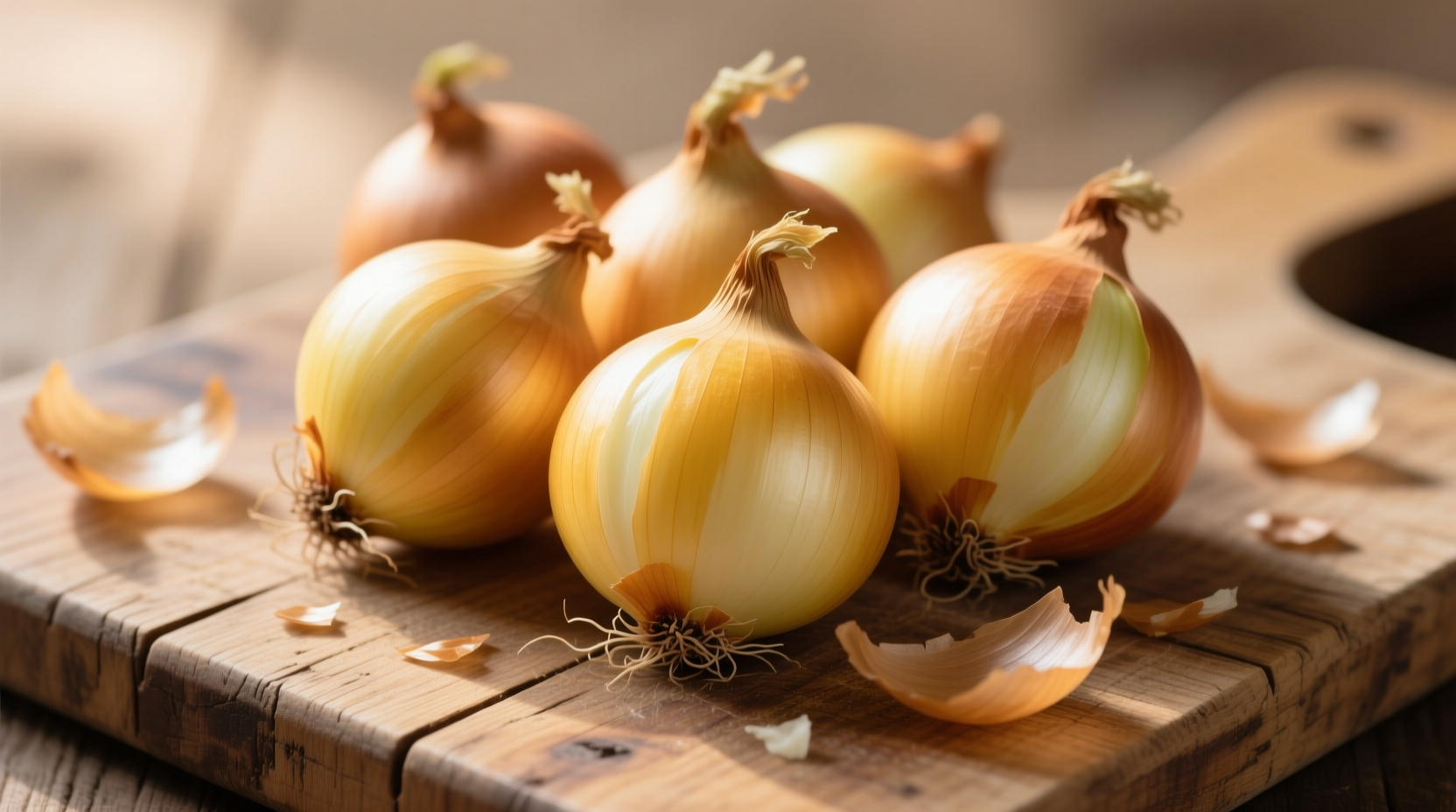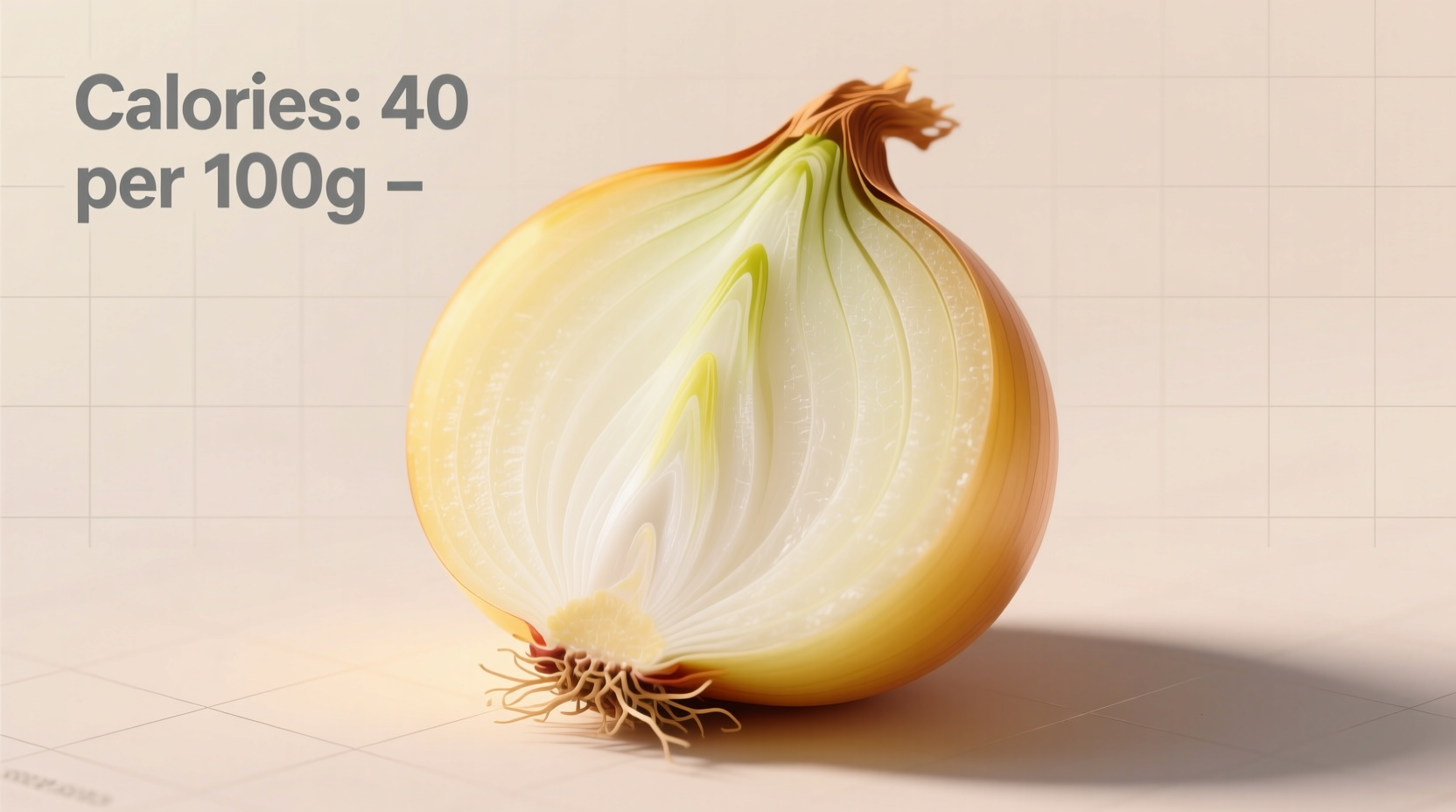Curious about the calorie content of this kitchen staple? Whether you're tracking your daily intake or planning a healthy recipe, knowing exactly how many calories are in 1 onion helps make informed dietary choices. Onions are incredibly versatile and pack a flavorful punch without adding significant calories to your meals.
Onion Nutrition Facts: Calorie Breakdown by Size
| Onion Type | Size/Weight | Calories | Carbohydrates | Fiber |
|---|---|---|---|---|
| Yellow Onion (medium) | 110g | 44 | 10g | 2g |
| Red Onion (medium) | 110g | 42 | 9.8g | 1.9g |
| White Onion (medium) | 110g | 43 | 10.1g | 2.1g |
| Green Onion (scallion) | 100g | 32 | 7.3g | 2.6g |
| Shallot (medium) | 25g | 16 | 3.8g | 0.8g |
Data sourced from the USDA FoodData Central database, the most reliable nutritional reference for food composition in the United States. These values represent raw onions, as cooking methods can slightly alter nutritional content.
Understanding Onion Nutrition Beyond Calories
While calories in 1 onion are minimal, their nutritional profile offers more than just low energy content. Onions contain valuable nutrients that contribute to overall health:
- Vitamin C - One medium onion provides about 11% of your daily recommended intake
- B vitamins - Particularly B6 and folate, essential for energy metabolism
- Antioxidants - Quercetin and other compounds with anti-inflammatory properties
- Prebiotic fiber - Supports gut health and beneficial bacteria growth
Unlike many low-calorie foods, onions add substantial flavor without needing added fats or sugars. This makes them an excellent choice for calorie-conscious cooking where you want to maintain taste without excess energy intake.

How Preparation Methods Affect Calorie Content
While the basic calorie count for one onion remains consistent when raw, preparation methods can influence the final nutritional profile in your dish:
- Raw onions - Maintain their natural 44 calories per medium onion
- Sautéed onions - Absorb some oil, adding approximately 40-80 calories depending on oil quantity
- Caramelized onions - Concentrate natural sugars through cooking, slightly increasing calories per volume
- Onion rings - Breading and deep frying dramatically increases calories (300+ per serving)
For those tracking onion nutrition facts per 100g, remember that cooking reduces water content, making cooked onions slightly more calorie-dense by weight than raw ones. However, you typically use less cooked onion to achieve the same flavor impact.
Practical Applications: Using Onions in Healthy Eating
Understanding how many calories in a raw onion helps you make smart choices in meal planning. Here's how to maximize onions' benefits while managing calorie intake:
- Flavor booster - Use raw onions in salads and salsas for crunch and flavor without added calories
- Soup and stew base - Create rich flavor foundations with minimal calories
- Meat substitute - Add texture and umami to vegetarian dishes, reducing need for higher-calorie ingredients
- Marinades - Use onion juice to tenderize proteins without adding significant calories
Professional chefs like myself often recommend keeping onions raw when possible to preserve their maximum nutritional value. When cooking is necessary, gentle sautéing preserves more nutrients than high-heat methods like caramelizing.
Onions in Different Dietary Approaches
Whether you're following keto, Mediterranean, or weight-loss diets, understanding onion calorie count for weight loss helps you make informed choices:
- Keto diets - Onions contain carbohydrates, so portion control matters (¼ cup diced onion = ~6g carbs)
- Diabetes management - Onions have a low glycemic load and may help regulate blood sugar
- Weight loss - Their high water and fiber content promotes satiety with minimal calories
- Intermittent fasting - Raw onions provide nutrients without breaking fasts (in small quantities)
For those specifically tracking red onion vs white onion calories, the difference is negligible - both provide similar nutritional profiles with slight variations in antioxidant content.
Common Questions About Onion Nutrition
Many home cooks wonder about the relationship between onion size and calories. A small onion (50g) contains about 20 calories, while a large onion (150g) has approximately 60 calories. The onion nutrition facts per 100g standard measurement shows 40 calories, making it easy to calculate for any portion size.
When comparing calories in one medium onion to other common vegetables, onions rank among the lowest in calories while providing distinctive flavor. This makes them an excellent choice for those seeking to reduce calorie intake without sacrificing taste in their meals.











 浙公网安备
33010002000092号
浙公网安备
33010002000092号 浙B2-20120091-4
浙B2-20120091-4